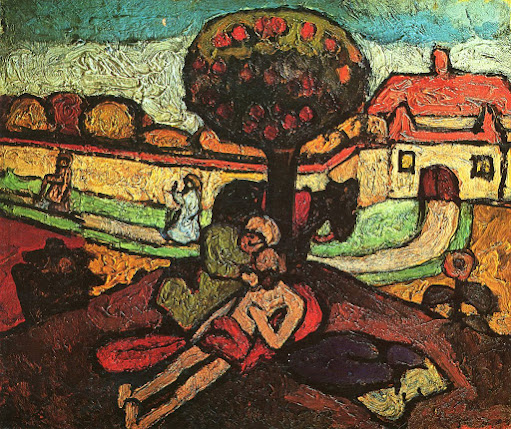 |
| Der barmherzige Samariter, Paula Modersohn-Becker, 1901 |
"Nevertheless, amidst the diversity of the theologies represented in our congregations, justice work has been a proxy for what we believe in some congregations, while in other congregations, engagement with the intellect, debate, and social ties have been the substitute. Our justice work without theological resources and spiritual practices leads us down the path of burn out. Many of us have come to this faith seeking an alternative faith home and drawn by its actions in the world. yet we don't often work to heal from our religious past. Those most harmed by the divisive and stressful times we live in are in need of faith tenets that can hold us fast in confusing times and help us make ethical and values-based choices about how to engage." — Widening The Circle of Concern: Report of the UUA Commission on Institutional Change, p. 10
Towards the end of my time as an evangelical I was a member of a fairly large multi-racial congregation that was very active in social outreach. We helped with cleanup after Hurricane Sandy, helped to support a homeless encampment, and the like. It wasn't really social justice work, but to our credit we were trying to look out for the material welfare of our human family. In one sermon that sticks out in my memory, our minister reminded us that without renewing our connection with the spiritual resources of our faith, we would burn out in the important work we were doing. He was right, and in a way that applies to social justice work as well.
Whenever I go to Pride in NYC, a march for immigrant justice, a climate rally, or a Black Lives Matters protest, I always see Unitarian Universalists there. We're recognizable either by the chalice on our hats or shirts, or by our yellow t-shirts which proclaim that we 'Side With Love.' This is good and right, and it's a vitally important thing to be present for such events, as well as work for just legislation, network to help refugees and detained immigrants, and so forth. How, though, do we sustain ourselves in the long dark nights when all seems lost? When the needs of the world and the enormity of injustice loom so very large?
You'll hear a lot about social justice in most Unitarian Universalist congregations. What you won't hear very often is why it matters to us. Sure, we can point to empathy as fundamental to ethics, and we can cite our 7 Principles that remind us of the value of each person, and of our interconnectedness. These, however, are not so often in our conversations or even our sermons.
For a time I some years ago I was with a small, conservative, lay led Christian church. What wore at my soul there was how much time we studied the Bible, and how little we did about it. We were constantly studying and never doing. It was a friendly but insular group, and they seemed more focused on sticking together than on reaching out.
There are plenty of tiny, cliquish UU congregations. Have no doubt about that. We have more than our share of lecture and debate hall style fellowships that are very cerebral and little interested in practical social justice work. They have something in common with the social justice oriented congregations, though, that they don't share with that small Christian church I described. The latter had a clear, well-defined, and often discussed theology, while the UU congregations with which I am familiar, either through experience or second hand information, have little notion of such.
Unless Unitarian Universalism develops a robust, distinctive theology rooted in our history and prophetic witness, how will we ever build cohesiveness and find a collective direction? Without identifying with our core theology, dynamic as it will surely be, how will we find and offer spiritual resources to nourish us on our journey? We can individually borrow from the religious traditions of the world, but that doesn't scale as well as we might hope
Our navel-gazing congregations and those that rally for social justice each and every week deserve a compelling theology that pushes them out into the world as needed, and that often calls the back to reflection.
